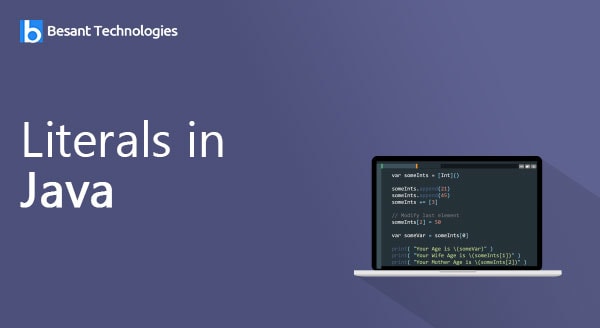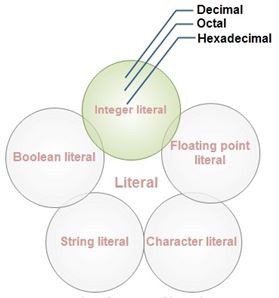
Literals in Java
Literals in Java
Literals is an identifier whose value is fixed and does not change during the execution of the program.
Types of Literals
Integer Literals
Integer Literals are numbers that has no fractional pars or exponent. It refers to the whole numbers. Integers always begin with a digit or + or -.
We can specify integer constants in
- Decimal
- Octal
- Hexadecimal
Decimal Integer Literals
It consists of any combination of digits taken from the set 0 to 9.
Example:
int a = 100; //Decimal Constant int b = -145 // A negative decimal constant int c = 065 // Leading zero specifies octal constant, not decimal
Octal Integer Literals
It consists of any combination of digits taken from the set 0 to 7. However the first digit must be 0, in order to identify the constant as octal number.
Example:
int a = 0374; //Octal Constant int b = 097; // Error: 9 is not an octal digit.
Hexadecimal Integer Literals
A Sequence of digits begin the specification with 0X or 0X, shadowed by a system of digits in the range 0 to 9 and A (a) to F(f).
Example:
int a = 0x34; int b = -0XABF;
Click Here-> Get Prepared for Java Interviews
Unsigned Literals
We use either u or U suffix for Unsigned Constants and use either the l or L suffix. for Long constants
Example :
328u 0x7FFFFFL 0776745ul;
Floating-point Literals
Floating-point Literals are also called as real constants. The Floating Point contains decimal points and can contain exponents. They are used to represent values that will have a fractional part and can be represented in two forms – fractional form and exponent form.
In the fractional form, the fractional number contains the integer part and fractional part. A dot (.) is used to separate the integer part and fractional part.
Example:
float x = 2.7f;
In the exponential form, the fractional number contains constants a mantissa and exponent. Mantissa contains the value of the number and the exponent contains the magnitude of the number. The exponent, if any present, specifies the magnitude of the number as a power of 10.
Example:
7.6: 23.46e0 // 23.46 x 100 = 23.46 x 1 = 23.46 23.46e1 // 23.46 x 101= 23.46 x10 = 234.6
Character Literals
Character Literals are specified as single character enclosed in pair of single quotation marks. Single character constants are internally represented as ASCII codes.
String Literals
String Literals are treated as an array of char. By default, the compiler adds a special character called the ‘null character’ (‘\0’) at the end of the string to mark the end of the string.
Example:
String str = “good morning”;
Boolean literals
There are two Boolean literals
- true represents a true Boolean value
- false represents a false Boolean value
Click Here-> Get Java Training with Real-time Projects



